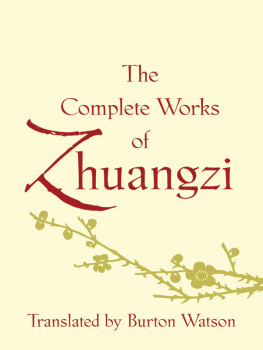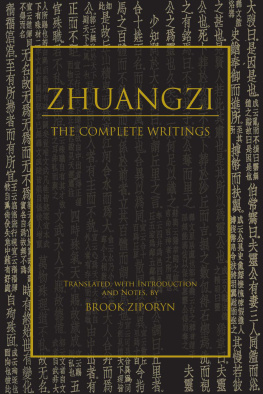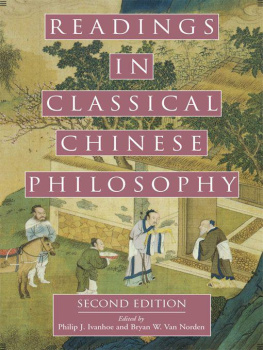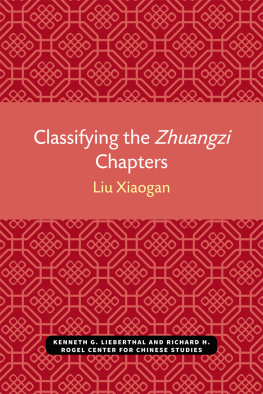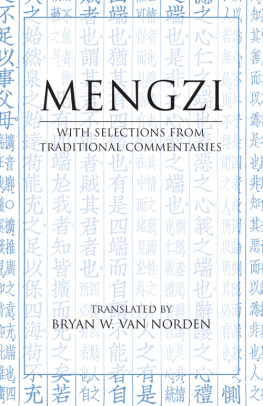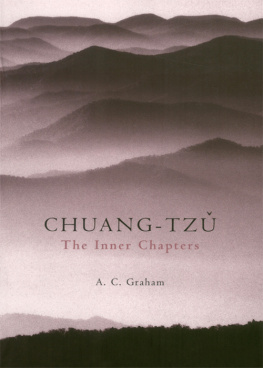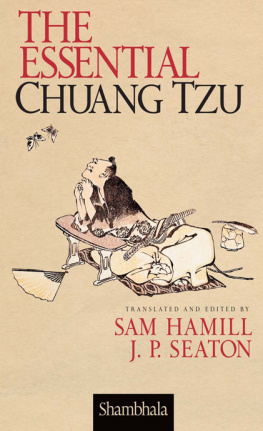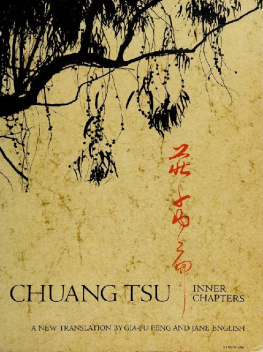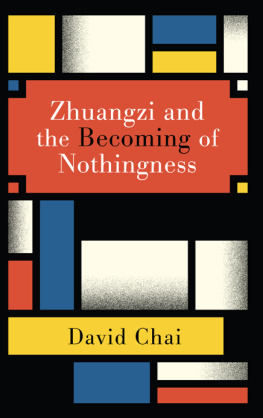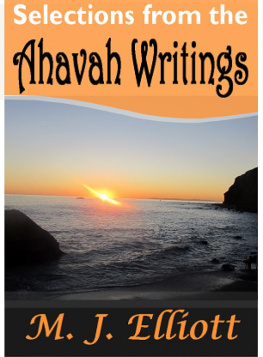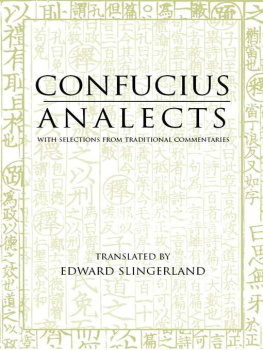

Copyright 2009 by Hackett Publishing Company, Inc.
All rights reserved
Printed in the United States of America
14 13 12 11 10 09 1 2 3 4 5 6
For further information, please address:
Hackett Publishing Company, Inc.
P.O. Box 44937
Indianapolis, IN 46244-0937
www.hackettpublishing.com
Cover design by Abigail Coyle
Text design by Carrie Wagner
Composition by Agnews, Inc.
Printed at Edwards Brothers, Inc.
Library of Congress Cataloging-in-Publication Data
Zhuangzi.
[Nanhua jing. English. Selections]
Zhuangzi : the essential writings with selections from traditional commentaries / translated, with introduction and notes, by Brook Ziporyn.
p. cm.
ISBN 978-0-87220-911-4 (pbk.) ISBN 978-0-87220-912-1 (cloth)
I. Ziporyn, Brook, 1964 II. Title.
BL1900.C5E5 2009
299.5'1482dc22
2008052827
PRC ISBN: 978-1-60384-287-7
CONTENTS
About Zhuangzi
Not much is known about Zhuang Zhou (ca. 369286 B.C.E. ), who was also called Zhuangzi (Master Zhuang), the ostensible author of this work of the same name. What we do know about the man himself, as opposed to his work, is limited to the brief biography written by Sima Qian (14586 B.C.E. ), telling us simply that Zhuangzi was a native of Meng in the state of Song (present-day Henan Province), and served as a minor official in an otherwise unknown locale described as the lacquer-tree park of Meng. One brief anecdote about the man is appended: King Wei of the state of Chu, hearing of Zhuangzis talents, sent a messenger to offer him financial support and perhaps to invite him to serve as prime minister in his government. Zhuangzi is said to have laughed and replied to the messenger:
A thousand measures of gold is a substantial profit, and a prime ministership is an exalted position indeed. But havent you ever heard about the ox offered in the official sacrifice? He is generously fed for years and dressed in the finest embroidered fabrics, so that he may one day be led into the Great Temple for slaughter. When that day comes, though he may wish that he were just a little orphaned piglet instead, it is too late! So scram, you! Do not defile me! Id rather enjoy myself wallowing in the filth than let myself be controlled by some head of state. Id rather remain without official position to the end of my days, enjoying myself whichever way I wish.
It is probably safe to assume that this story is less factual than rhetorical. That is also true of the tales about the character named Zhuangzi that we find in the book that bears his name. Even in this brief sketch, however, we begin to see that convergence of apparently contradictory identities that make Zhuangzi so fascinating: acerbic mystic, subtle rustic, bottom dweller and high flyer, unassuming rebel, abstruse jester, frivolous sage. Profound comedians have always been hard to come by; funny philosophers perhaps even more so. To enter into this work attributed to Zhuangzi is to find oneself roused and enraptured not only by its intellectual and spiritual depth, but also by its provocative humor and its sonorous beauty. But what is perhaps even more precious and unusual here is that these three heady torques seem to erupt in this work all at once: it is precisely Zhuangzis humor that is beautiful, his beauty that is profound, his profundity that is comic. This work defies the dreary but prevalent notion that the serious is the important, that the playful is the inconsequential, and above all that we are under some obligation to draw conclusions about ourselves and our world and then stick to them. Zhuangzi refuses to let himself be completely known; indeed, he seems to deny the possibility and even desirability of total understanding, of himself or of anything else. But at the same time he shows himself to us, an unignorable and unforgettable presence that is all the more vivid and evocative for its staunch evasion of ultimate knowability or definitive identity. Encountering Zhuangzi opens a window into a world of enlivening confusions, taunting misdirections, surreal grotesqueries, merciless satire, virtuoso reasonings, insouciant despair, mischievous fallacies, morbid exuberances, impudent jokes, and jolting nonsequiturs, which nonetheless has the most profoundly consequential things to say about the gravest human problems of living, dying, and knowing. Who is this man? What is this book?
About This Book
This volume is organized around a certain way of reading the highly complex text attributed to Zhuangzi. The present version of the original Chinese work consists of thirty-three chapters, edited down from a no longer extant fifty-two chapter version. Most traditional readers took this work to be a single integrated text written by one person. The varying viewpoints expressed in these chapters were thus regarded as in some sense compatible, being expressions of different aspects of a single coherent point of view. Some classical literati, as well as modern scholars such as A. C. Graham and Liu Xiaogan, however, have seen the text as the work of various different authors with related ideas which may or may not be ultimately compatible with one another. A still more extreme view, embraced by Graham, is that even the first seven chapters (known as the Inner Chapters, generally regarded as the most reliably attributable to the historical Zhuang Zhou himself) are mutilated and cannot be read coherently as they stand without forced interpretations that distort their original intent, which can only be speculatively reconstructed.
Given what we know about the Zhuangzi s textual history, then, there are several ways to read this material. Some have suggested that we can interpret the Zhuangzi as a coherent thirty-three chapter text expressing a unified viewpoint, recognizing the unifying hand as that of its compiler and editor, the brilliant commentator Guo Xiang, rather than that of a certain shadowy figure named Zhuang Zhou. Guo at least saw this entire text as expressing a single consistent vision, and we can interpret the text so as to understand this viewpoint, Guos, rather than that of the historical Zhuang Zhou, of which we have no certain knowledge. The opposite extreme is to read each of the sections independently, trying to discern the various authors individual ideas, as Graham and Liu (and some traditional commentators such as Wang Fuzhi) have done.
The arrangement of this translation is based on an interpretive stance somewhere between these two extremes. The first seven chapters of the traditional text, known as the Inner Chapters, are here regarded as forming a single, coherent work, expressing an integrated and intelligible philosophical point of view, attributable to the historical figure of Zhuang Zhou. In accord with scholarly consensus, the remaining sections of the text are taken to be the work of multiple authors, written within a hundred and fifty years or so of Zhuangzis death. These remaining sectionsknown as the Outer Chapters (8 through 22) and Miscellaneous Chapters (23 through 33)might be read as various receptions and responses to the main text: commentaries, extensions, ruminations, domestications, and developments building upon the themes of the Inner Chapters. Each of these responses would have developed within the differing contexts of the philosophical concerns and historical circumstances of their authors, and these are worth discussion in their own right, as Graham and Liu have attempted. We might also read this series of responses to Zhuangzis original writings (the Inner Chapters) as instances of the ways in which their implications have ramified over time.
Next page

